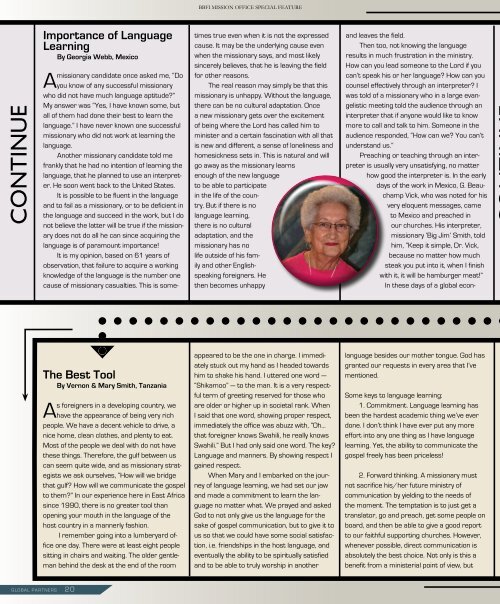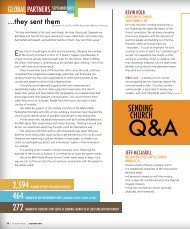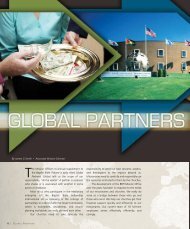Deputation - Baptist Bible Tribune
Deputation - Baptist Bible Tribune
Deputation - Baptist Bible Tribune
- No tags were found...
Create successful ePaper yourself
Turn your PDF publications into a flip-book with our unique Google optimized e-Paper software.
BBFI Mission office special featurecontinueImportance of LanguageLearningBy Georgia Webb, Mexicomissionary candidate once asked me, “DoA you know of any successful missionarywho did not have much language aptitude?”My answer was “Yes, I have known some, butall of them had done their best to learn thelanguage.” I have never known one successfulmissionary who did not work at learning thelanguage.Another missionary candidate told mefrankly that he had no intention of learning thelanguage, that he planned to use an interpreter.He soon went back to the United States.It is possible to be fluent in the languageand to fail as a missionary, or to be deficient inthe language and succeed in the work, but I donot believe the latter will be true if the missionarydoes not do all he can since acquiring thelanguage is of paramount importance!It is my opinion, based on 61 years ofobservation, that failure to acquire a workingknowledge of the language is the number onecause of missionary casualties. This is sometimestrue even when it is not the expressedcause. It may be the underlying cause evenwhen the missionary says, and most likelysincerely believes, that he is leaving the fieldfor other reasons.The real reason may simply be that thismissionary is unhappy. Without the language,there can be no cultural adaptation. Oncea new missionary gets over the excitementof being where the Lord has called him tominister and a certain fascination with all thatis new and different, a sense of loneliness andhomesickness sets in. This is natural and willgo away as the missionary learnsenough of the new languageto be able to participatein the life of the country.But if there is nolanguage learning,there is no culturaladaptation, and themissionary has nolife outside of his familyand other Englishspeakingforeigners. Hethen becomes unhappyand leaves the field.Then too, not knowing the languageresults in much frustration in the ministry.How can you lead someone to the Lord if youcan’t speak his or her language? How can youcounsel effectively through an interpreter? Iwas told of a missionary who in a large evangelisticmeeting told the audience through aninterpreter that if anyone would like to knowmore to call and talk to him. Someone in theaudience responded, “How can we? You can’tunderstand us.”Preaching or teaching through an interpreteris usually very unsatisfying, no matterhow good the interpreter is. In the earlydays of the work in Mexico, G. BeauchampVick, who was noted for hisvery eloquent messages, cameto Mexico and preached inour churches. His interpreter,missionary ‘Big Jim’ Smith, toldhim, “Keep it simple, Dr. Vick,because no matter how muchsteak you put into it, when I finishwith it, it will be hamburger meat!”In these days of a global econ-The Best ToolBy Vernon & Mary Smith, TanzaniaAs foreigners in a developing country, wehave the appearance of being very richpeople. We have a decent vehicle to drive, anice home, clean clothes, and plenty to eat.Most of the people we deal with do not havethese things. Therefore, the gulf between uscan seem quite wide, and as missionary strategistswe ask ourselves, “How will we bridgethat gulf? How will we communicate the gospelto them?” In our experience here in East Africasince 1990, there is no greater tool thanopening your mouth in the language of thehost country in a mannerly fashion.I remember going into a lumberyard officeone day. There were at least eight peoplesitting in chairs and waiting. The older gentlemanbehind the desk at the end of the roomappeared to be the one in charge. I immediatelystuck out my hand as I headed towardshim to shake his hand. I uttered one word —“Shikamoo” — to the man. It is a very respectfulterm of greeting reserved for those whoare older or higher up in societal rank. WhenI said that one word, showing proper respect,immediately the office was abuzz with, “Oh…that foreigner knows Swahili, he really knowsSwahili.” But I had only said one word. The key?Language and manners. By showing respect Igained respect.When Mary and I embarked on the journeyof language learning, we had set our jawand made a commitment to learn the languageno matter what. We prayed and askedGod to not only give us the language for thesake of gospel communication, but to give it tous so that we could have some social satisfaction,i.e. friendships in the host language, andeventually the ability to be spiritually satisfiedand to be able to truly worship in anotherlanguage besides our mother tongue. God hasgranted our requests in every area that I’vementioned.Some keys to language learning:1. Commitment. Language learning hasbeen the hardest academic thing we’ve everdone. I don’t think I have ever put any moreeffort into any one thing as I have languagelearning. Yet, the ability to communicate thegospel freely has been priceless!2. Forward thinking. A missionary mustnot sacrifice his/her future ministry ofcommunication by yielding to the needs ofthe moment. The temptation is to just get atranslator, go and preach, get some people onboard, and then be able to give a good reportto our faithful supporting churches. However,whenever possible, direct communication isabsolutely the best choice. Not only is this abenefit from a ministerial point of view, but20 | <strong>Baptist</strong> <strong>Bible</strong> <strong>Tribune</strong> | January 2010global partners 20
















